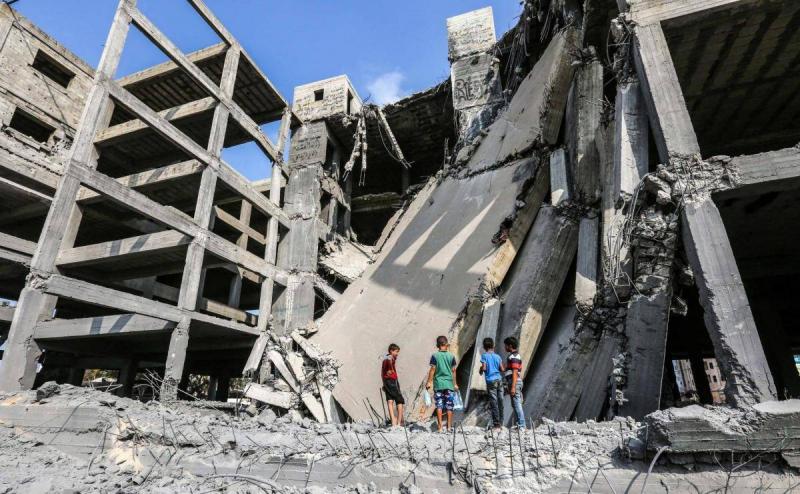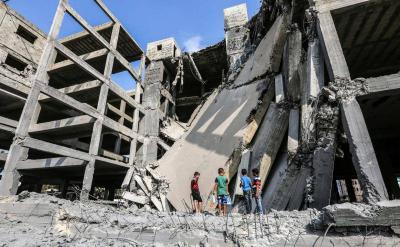A new round of negotiations begins today in Doha, aiming to establish a ceasefire agreement in Gaza amid increasing doubts about the feasibility of achieving this, raising the risks of the conflict expanding into a full-scale war in the region. International mediators hope to restart the stalled ceasefire talks between Israel and Hamas during this new round of discussions, ultimately aiming for an agreement between the two sides. However, the chances of a breakthrough appear slim, according to a report from ABC News. For over two months, Israel and Hamas have been considering an internationally supported proposal that would end the ongoing war for ten months and secure the release of approximately 110 hostages still held in Gaza. The likelihood of imminent Iranian strikes against Israel raises concerns of a broader conflict. American and Iranian officials have suggested that significant progress on a ceasefire in Gaza could lead to an immediate de-escalation in regional tensions.
**What is the goal of the new round of negotiations?**
International mediators approach this new round aware of its high stakes, as it comes amid rising fears of escalation in the conflict from Iran and Hezbollah. The New York Times reports that negotiators are racing against time to reach a ceasefire that could defuse tensions before a predicted Iranian attack on Israel. Mediators have spent months trying to persuade both sides to agree to a three-phase plan, where Hamas is scheduled to release the remaining hostages taken during its October 7 attack in exchange for Palestinian prisoners held by Israel, alongside a withdrawal of Israeli forces from Gaza. This round of talks is based on a proposal presented by U.S. President Joe Biden in a national address on May 31, calling for a ceasefire, the release of Israeli hostages, Palestinian prisoners, and the reconstruction of Gaza. White House officials have stated that Hamas has already accepted this plan and that Israel has supported it. On Monday, leaders from France, Germany, and Britain endorsed calls for a ceasefire in Gaza, the return of dozens of hostages held by Hamas, and the delivery of humanitarian aid "without restrictions." A joint French, German, and British statement declared, "The fighting must end now, and all hostages still held by Hamas must be released. The people of Gaza urgently need the delivery and distribution of humanitarian aid unimpeded."
**What is its significance?**
This new round comes following a significant blow to the negotiations last month when Hamas leader Ismail Haniyeh was killed while attending the inauguration of the Iranian president in Tehran. Israel was blamed for the incident, which it neither confirmed nor denied. Biden noted that this event "did not help" ceasefire efforts and pushed the talks into a highly stagnant state. Haniyeh's assassination came just hours after Israel assassinated senior Hezbollah commander Fouad Shukr in a raid in Beirut. Both strikes prompted threats of retaliation from Iran and Hezbollah, with the fear of a full-scale regional war diverting international attention from efforts to end the fighting in Gaza. The killings spurred a wave of diplomatic activity, and the White House underscored the importance of this latest round of ceasefire negotiations. White House spokeswoman Karine Jean-Pierre stated that the latest negotiations between Israel and Hamas in Gaza are "essential." She said, "Tomorrow will be an important day. We want to see a ceasefire. We want to see an end to this war, and we want to see the hostages return home, including American hostages, and we want to see an increase in humanitarian aid going to Gaza. We believe the way to calm the tensions we are witnessing in the Middle East is to reach this agreement." On Monday, leaders from France, Germany, and Britain supported ongoing U.S. efforts with Qatar and Egypt to mediate an agreement to end the ongoing war between Israel and Hamas that has lasted for more than ten months. An NPR report notes that this new round comes with more than two million Palestinians living in Gaza under increasingly degrading conditions, with daily deaths from Israeli airstrikes and remaining Israeli hostages held captive.
**Will Hamas attend?**
The ceasefire talks, which are expected to take place in Doha, Qatar, or Cairo, were anticipated to include high-ranking intelligence officials from Egypt, Israel, and the United States, as well as the Qatari Prime Minister, according to the New York Times. It remained unclear as of late Wednesday whether Hamas would attend the negotiations starting Thursday. Ahmed Abdul Hadi, Hamas's representative in Lebanon, stated in an interview that doing so would mean "going back to square one," accusing Israeli Prime Minister Benjamin Netanyahu of stalling negotiations. He added: "Netanyahu is not interested in reaching an agreement that fully ends the aggression; rather, he is deceiving and evading and wants to prolong the war, even to expand it regionally." New York Times sources familiar with the talks, speaking on condition of anonymity, noted that Hamas would still be willing to communicate with mediators after the meeting if Israel provided a "serious response" to Hamas's latest offer in early July. Vedant Patel, spokesman for the U.S. State Department, stated that Qatari officials assured the U.S. they would work to represent Hamas in the talks, but it was not mentioned whether members of the movement would attend in person or be represented solely by intermediaries. He continued, "We fully expect these talks to proceed as they should. Our view is that all negotiators should be back at the table... Our Qatari partners have assured us that there will be representation from Hamas (in the negotiations)." From the Israeli side, the Israeli Prime Minister approved the negotiation team to depart for Qatar to conduct ceasefire talks. Netanyahu's office stated that the Israeli leader gave the green light for the negotiation team to leave for Qatar to conduct ceasefire discussions. Israel and Hamas have been considering an internationally supported proposal for over two months that would end the ongoing war and secure the release of around 110 hostages still held in Gaza. During this period, indirect negotiations have not made substantial progress, and remaining points of contention persist, with new conditions proposed complicating the prospects for advancements.
**What are the negotiation scenarios?**
The new round of negotiations begins amid ongoing points of contention. Israel has expressed concerns about a clause in the plan that would extend the initial ceasefire throughout the second phase of the negotiations. Israel seems worried that Hamas could prolong unproductive negotiations indefinitely. Hamas, for its part, appears concerned that Israel will resume hostilities as soon as some of its hostages are returned. Additionally, Israel has recently added further demands to the initial agreement proposal, according to Egyptian officials familiar with the negotiations who spoke to the Associated Press. In a statement, Netanyahu's office denied this, describing the additional conditions as "basic clarifications." Israel claimed that Hamas added 29 demands and conditions without specifying any of them. Egyptian officials reported that Israel seeks to maintain control over the Salah al-Din axis (Philadelphi Corridor), which it believes Hamas uses to smuggle weapons through underground tunnels, a claim denied by Egypt. Israel demands the presence of its forces along the east-west route that divides Gaza to eliminate any militants crossing into northern Gaza. Netanyahu's office stated that Israel wants assurances for this but denied it is an additional condition. Hamas rejected this demand, arguing that Israel would use it as a pretext to prevent Palestinians from returning home. Egyptian officials and Netanyahu's office also stated that Israel is demanding the right to refuse the release of certain Palestinian prisoners, while Hamas rejects any compromises regarding this matter. Israel is also demanding a list of the names of hostages still alive, which Hamas has refused, according to officials who requested anonymity because they are not authorized to discuss these sensitive negotiations with the media.




